Chuck Colson |
Charles Wendell Colson (October 16, 1931 – April 21, 2012), generally referred to as Chuck Colson, was an American attorney and political advisor who served as Special Counsel to President Richard Nixon. In 1976, he founded Prison Fellowship, which is now the nation’s largest Christian nonprofit serving prisoners, former prisoners, and their families, and a leading advocate for criminal justice reform. On November 6, 1969 Colson was appointed as Special Counsel to President Nixon. Once known as President Nixon's "hatchet man", Colson gained notoriety at the height of the Watergate scandal, for being named as one of the Watergate Seven, and also for pleading guilty to obstruction of justice for attempting to defame Pentagon Papers defendant Daniel Ellsberg. In 1974, he served seven months in the federal Maxwell Prison in Alabama, as the first member of the Nixon administration to be incarcerated for Watergate-related charges.
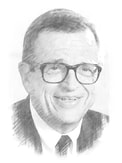 Chuck Colson
Chuck Colson
“I know the resurrection is a fact, and Watergate proved it to me. How? Because 12 men testified they had seen Jesus raised from the dead, then they proclaimed that truth for 40 years, never once denying it. Every one was beaten, tortured, stoned and put in prison. They would not have endured that if it weren't true. Watergate embroiled 12 of the most powerful men in the world-and they couldn't keep a lie for three weeks. You're telling me 12 apostles could keep a lie for 40 years? Absolutely impossible.” ― Charles Colson
August 26, 2022: Christian Headlines: Max's Hearts Reach Ukraine
Frequent readers and listeners of Breakpoint know about Max. The grandson of Chuck Colson and subject of a book called Dancing With Max, authored by Emily Colson (Chuck’s daughter and Colson Center board member), Max is a remarkable young man who has autism. The last few years have been difficult for Emily and Max, especially since the COVID lockdowns disrupted their routines and canceled their helpers. The last few years were particularly hard on full-time caretakers.
Frequent readers and listeners of Breakpoint know about Max. The grandson of Chuck Colson and subject of a book called Dancing With Max, authored by Emily Colson (Chuck’s daughter and Colson Center board member), Max is a remarkable young man who has autism. The last few years have been difficult for Emily and Max, especially since the COVID lockdowns disrupted their routines and canceled their helpers. The last few years were particularly hard on full-time caretakers.
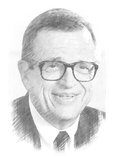 Chuck Colson
Chuck Colson
“It is not what we do that matters, but what a sovereign God chooses to do through us. God doesn't want our success; He wants us. He doesn't demand our achievements; He demands our obedience. The Kingdom of God is a kingdom of paradox, where through the ugly defeat of a cross, a holy God is utterly glorified. Victory comes through defeat; healing through brokenness; finding self through losing self.” ― Charles Colson
“It is not what we do that matters, but what a sovereign God chooses to do through us. God doesn't want our success; He wants us. He doesn't demand our achievements; He demands our obedience. The Kingdom of God is a kingdom of paradox, where through the ugly defeat of a cross, a holy God is utterly glorified. Victory comes through defeat; healing through brokenness; finding self through losing self.” ― Charles Colson
June 18, 2022: Bruce Ashford: A Phoenix, Arising from the Ashes: Chuck Colson and the Watergate Scandal at 50
In 1971, Colson had authored a memo listing Nixon’s major political opponents. News stories circulated, saying that Colson had boasted that he would “would walk over my own grandmother if necessary” to secure Nixon’s re-election.
Thus, when Colson was indicted, convicted, and sentenced to prison, he experienced it as a personal disaster. Yet, during his seven-month stint at Maxwell Correctional Facility (Alabama), Colson experienced a profound spiritual renewal that would transform the remainder of his life and exert enormous influence on American society.
In 1971, Colson had authored a memo listing Nixon’s major political opponents. News stories circulated, saying that Colson had boasted that he would “would walk over my own grandmother if necessary” to secure Nixon’s re-election.
Thus, when Colson was indicted, convicted, and sentenced to prison, he experienced it as a personal disaster. Yet, during his seven-month stint at Maxwell Correctional Facility (Alabama), Colson experienced a profound spiritual renewal that would transform the remainder of his life and exert enormous influence on American society.
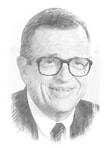 Chuck Colson
Chuck Colson
“Christians should never have a political party. It is a huge mistake to become married to an ideology, because the greatest enemy of the gospel is ideology. Ideology is a man-made format of how the world ought to work, and Christians instead believed in the revealing truth Scripture.”
― Charles Colson
Aug 26, 2021: ABC Religion & Ethics: “Mere Christianity” at 80: Why does C.S. Lewis’s unlikely classic continue to hold such appeal?
Perhaps the highest-profile Mere Christianity convert was Charles Colson, Richard Nixon’s so-called “hatchet man”, who read the book after a glittering legal and political rise and before serving a seven-month prison sentence for his part in the Watergate scandal. At a time of existential malaise, he encountered an old friend and client who had become a Christian since they last met. Colson was struck with the evident change in him. This friend shared with him a passage from Lewis’s chapter titled “The Great Sin”, about pride:
Perhaps the highest-profile Mere Christianity convert was Charles Colson, Richard Nixon’s so-called “hatchet man”, who read the book after a glittering legal and political rise and before serving a seven-month prison sentence for his part in the Watergate scandal. At a time of existential malaise, he encountered an old friend and client who had become a Christian since they last met. Colson was struck with the evident change in him. This friend shared with him a passage from Lewis’s chapter titled “The Great Sin”, about pride:
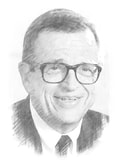 Chuck Colson
Chuck Colson
“But all at once I realized that it was not my success God had used to enable me to help those in this prison, or in hundreds of others just like it. My life of success was not what made this morning so glorious -- all my achievements meant nothing in God's economy.
"No, the real legacy of my life was my biggest failure -- that I was an ex-convict. My greatest humiliation -- being sent to prison -- was the beginning of God's greatest use of my life; He chose the one thing in which I could not glory for His glory.” ― Charles Colson
"No, the real legacy of my life was my biggest failure -- that I was an ex-convict. My greatest humiliation -- being sent to prison -- was the beginning of God's greatest use of my life; He chose the one thing in which I could not glory for His glory.” ― Charles Colson
Apr 22, 2015: Charisma: In Final Book Debuting This Week, the Late Charles Colson Talks Islam, Gay Marriage and Christian Persecution
Today, on the third anniversary of the death of Charles W. "Chuck" Colson, one of the most eloquent and influential evangelical Christian leaders of our time, Zondervan announces the upcoming release of Colson's last published work, My Final Word: Holding Tight to the Issues that Matter Most (Aug. 4, 2015).
Today, on the third anniversary of the death of Charles W. "Chuck" Colson, one of the most eloquent and influential evangelical Christian leaders of our time, Zondervan announces the upcoming release of Colson's last published work, My Final Word: Holding Tight to the Issues that Matter Most (Aug. 4, 2015).
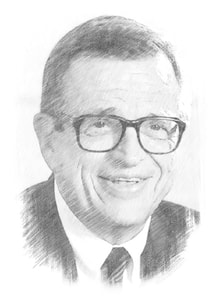 Chuck Colson
Chuck Colson
More than forty years ago, on August 28, 1963, a quarter million people gathered in front of the Lincoln Memorial. They marched here for the cause of civil rights. And that day they heard Martin Luther King Jr. deliver his famous “I Have a Dream” speech, a speech in which he challenged America to fulfill her promise.
“I have a dream,” he said, “that one day this nation will rise up and live out the true meaning of its creed. ‘We hold these truths to be self-evident that all men are created equal.’”
While we know of the speech, most people are unaware that King also penned one of the most eloquent defenses of the moral law: the law that formed the basis for his speech, for the civil rights movement, and for all of the law, for that matter.
In the spring of 1963, King was arrested for leading a series of massive non-violent protests against the segregated lunch counters and discriminatory hiring practices rampant in Birmingham, Alabama. While in jail, King received a letter from eight Alabama ministers. They agreed with his goals, but they thought that he should call off the demonstrations and obey the law.
King explained why he disagreed in his famous “Letter From a Birmingham Jail:” “One might well ask,” he wrote, “how can you advocate breaking some laws and obeying others?” The answer “is found in the fact that there are two kinds of laws: just laws … and unjust laws. One has not only a legal but a moral responsibility to obey just laws,” King said, “but conversely, one has a moral responsibility to disobey unjust laws.”
How does one determine whether the law is just or unjust? A just law, King wrote, “squares with the moral law of the law of God. An unjust law … is out of harmony with the moral law.” Then King quoted Saint Augustine: “An unjust law is no law at all.” He quoted Thomas Aquinas: “An unjust law is a human law not rooted in eternal or natural law.”
This is the great issue today in the public square: Is the law rooted in truth? Is it transcendent, immutable, and morally binding? Or is it, as liberal interpreters argue, simply whatever courts say it is? Do we discover the law, or do we create it? Many think of King as a liberal firebrand, waging war on traditional values. Nothing could be further from the truth. King was a great conservative on this central issue, and he stood on the shoulders of Augustine and Aquinas, striving to restore our heritage of justice rooted in the law of God.
Were he alive today, I believe he’d be in the vanguard of the pro-life movement. I also believe that he would be horrified at the way in which out-of-control courts have trampled down the moral truths he advocated. From the time of Emperor Nero, who declared Christianity illegal, to the days of the American slave trade, from the civil rights struggle of the sixties to our current battles against abortion, euthanasia, cloning, and same-sex “marriage,” Christians have always maintained exactly what King maintained.
--Chuck Colson; Breakpioint
“I have a dream,” he said, “that one day this nation will rise up and live out the true meaning of its creed. ‘We hold these truths to be self-evident that all men are created equal.’”
While we know of the speech, most people are unaware that King also penned one of the most eloquent defenses of the moral law: the law that formed the basis for his speech, for the civil rights movement, and for all of the law, for that matter.
In the spring of 1963, King was arrested for leading a series of massive non-violent protests against the segregated lunch counters and discriminatory hiring practices rampant in Birmingham, Alabama. While in jail, King received a letter from eight Alabama ministers. They agreed with his goals, but they thought that he should call off the demonstrations and obey the law.
King explained why he disagreed in his famous “Letter From a Birmingham Jail:” “One might well ask,” he wrote, “how can you advocate breaking some laws and obeying others?” The answer “is found in the fact that there are two kinds of laws: just laws … and unjust laws. One has not only a legal but a moral responsibility to obey just laws,” King said, “but conversely, one has a moral responsibility to disobey unjust laws.”
How does one determine whether the law is just or unjust? A just law, King wrote, “squares with the moral law of the law of God. An unjust law … is out of harmony with the moral law.” Then King quoted Saint Augustine: “An unjust law is no law at all.” He quoted Thomas Aquinas: “An unjust law is a human law not rooted in eternal or natural law.”
This is the great issue today in the public square: Is the law rooted in truth? Is it transcendent, immutable, and morally binding? Or is it, as liberal interpreters argue, simply whatever courts say it is? Do we discover the law, or do we create it? Many think of King as a liberal firebrand, waging war on traditional values. Nothing could be further from the truth. King was a great conservative on this central issue, and he stood on the shoulders of Augustine and Aquinas, striving to restore our heritage of justice rooted in the law of God.
Were he alive today, I believe he’d be in the vanguard of the pro-life movement. I also believe that he would be horrified at the way in which out-of-control courts have trampled down the moral truths he advocated. From the time of Emperor Nero, who declared Christianity illegal, to the days of the American slave trade, from the civil rights struggle of the sixties to our current battles against abortion, euthanasia, cloning, and same-sex “marriage,” Christians have always maintained exactly what King maintained.
--Chuck Colson; Breakpioint
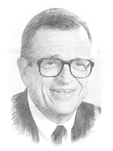 Chuck Colson
Chuck Colson
"Elections are important. Whoever serves in office, it makes a difference what kind of person that is and what that person believes. But elections can't solve the problem we've got. The problem we've got is that our culture has been decaying from the inside for 30 or 40 years, and politics is nothing but an expression of culture." --Chuck Colson
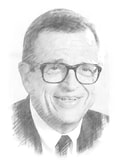 Chuck Colson
Chuck Colson
“The Bible- banned, burned, beloved. More widely read, more frequently attacked than any other book in history. Generations of intellectuals have attempted to discredit it; dictators of every age have outlawed it and executed those who read it. Yet soldiers carry it into battle believing it is more powerful than their weapons. Fragments of it smuggled into solitary prison cells have transformed ruthless killers into gentle saints. Pieced together scraps of Scripture have converted whole villages of pagan Indians.” ― Charles Colson
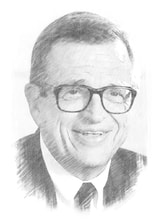 Chuck Colson
Chuck Colson
“In his final days Bill Bright gave his staff a charge, which ended with these words: “By faith, walk in His light, enjoy His presence, love with His love, and rejoice that you are never alone; He is with you, always to bless!”3 Bill Bright understood that the good life means accepting that our lives ultimately belong to God. He resisted taking sedatives that would have hastened his death. He also talked with Vonette about the importance of yielding to God’s final call. Perhaps as a result of his attitude (and, I have to think, his godliness), his last moments were not the unmitigated horror his doctor had predicted. Right before Bill died, Vonette leaned close and said, “I want you to go to be with Jesus, and Jesus wants you to come to him. Why don’t you let him carry you to heaven?” She looked away, and when she looked back, her husband was no longer breathing. She saw the last pulse in his neck, and with that he was gone. She thought of the psalm “Precious in the sight of the Lord is the death of his saints,” and the prayer of St. Francis of Assisi: “For it is in dying, we are born to eternal life.”4 Living the good life means not only living it to the fullest every moment we’re alive but also facing death with equanimity and then dying well. A lot of people have this wrong. They think that you live life to the fullest and enjoy every moment you can, and then when death comes, you simply accept the hard fact. The good time is over. Life is ended. The good life means accepting that our lives ultimately belong to God.” ― Charles W. Colson, The Good Life

April 2012:
Chuck Colson died Saturday. I dont necessarily consider him one of my lifes greatest mentors, but much of his work has been both inspirational and insightful to me as I have journeyed through this lifetime.
I recollect first hearing about him in a list of a dozen or so other men involved in what, to me at the time, was a pretty big scandal that eventually caused President Nixon to resign. I was still in my early teens and really didn't understand the whole context of what had happened in 1974. My mind was preoccupied with other things as a teen and being part of a broken family (my dad had died four years earlier) I look back and think that if the dictionary had a definition of a "dysfunctional" family it would have been a great definition to just have a picture of our family.
I dont mention this much, so this may come as news to many, but, in 1978, as a court defined "child in need of supervision" I ended up spending April through September going back and forth between the Fall River Country Jail and the Juvenile Detention center in Rapid City, South Dakota. In teen years, that many months is almost a life time. I played a lot of cards and did a lot of reading. One of the books I happened to read was a book called "Born Again" by Chuck Colson and read other things about this "Prison Fellowship" ministry he was starting. That was one of several books I read that made me start looking at the Bible. I went in as an atheist, slowly became an agnostic...and the started reading the Bible. Starting from the beginning, the old testament made little sense...so I started at Matthew and began reading the Bible through for my first time. Later I picked up "The Late Great Planet Earth" by Hal Lindsey and I guess it kind of "scared me to heaven," cuz somewhere before September I became a Christian. I dont have a date and time and have even been told by some that if you dont have a date and time then you are not legitimately saved. Well, I lost track of time in the place I was residing but know it was legit...just somewhere around August or Sept 1978. I was released on probation since I had turned 18 that year (in July).
Anyway, to keep on the subject...later I became somewhat of political activist. There really werent a lot of authors I could find that I thought had any real political insight...though, at the time, I assumed that since Jesus was "compassionate" He had to be a Democrat, so thats what I became initially. Reality and Reagan cured me of that. But one author that came up every now and again who really had some keen insight in the realm of American politics was Chuck Colson. I loved "Kingdoms in Conflict," "A Dance with Deception", and several others. I dont recollect the magazine, but he also had a periodical column that was always insightful.
Chuck Colson died Saturday. I dont necessarily consider him one of my lifes greatest mentors, but much of his work has been both inspirational and insightful to me as I have journeyed through this lifetime.
I recollect first hearing about him in a list of a dozen or so other men involved in what, to me at the time, was a pretty big scandal that eventually caused President Nixon to resign. I was still in my early teens and really didn't understand the whole context of what had happened in 1974. My mind was preoccupied with other things as a teen and being part of a broken family (my dad had died four years earlier) I look back and think that if the dictionary had a definition of a "dysfunctional" family it would have been a great definition to just have a picture of our family.
I dont mention this much, so this may come as news to many, but, in 1978, as a court defined "child in need of supervision" I ended up spending April through September going back and forth between the Fall River Country Jail and the Juvenile Detention center in Rapid City, South Dakota. In teen years, that many months is almost a life time. I played a lot of cards and did a lot of reading. One of the books I happened to read was a book called "Born Again" by Chuck Colson and read other things about this "Prison Fellowship" ministry he was starting. That was one of several books I read that made me start looking at the Bible. I went in as an atheist, slowly became an agnostic...and the started reading the Bible. Starting from the beginning, the old testament made little sense...so I started at Matthew and began reading the Bible through for my first time. Later I picked up "The Late Great Planet Earth" by Hal Lindsey and I guess it kind of "scared me to heaven," cuz somewhere before September I became a Christian. I dont have a date and time and have even been told by some that if you dont have a date and time then you are not legitimately saved. Well, I lost track of time in the place I was residing but know it was legit...just somewhere around August or Sept 1978. I was released on probation since I had turned 18 that year (in July).
Anyway, to keep on the subject...later I became somewhat of political activist. There really werent a lot of authors I could find that I thought had any real political insight...though, at the time, I assumed that since Jesus was "compassionate" He had to be a Democrat, so thats what I became initially. Reality and Reagan cured me of that. But one author that came up every now and again who really had some keen insight in the realm of American politics was Chuck Colson. I loved "Kingdoms in Conflict," "A Dance with Deception", and several others. I dont recollect the magazine, but he also had a periodical column that was always insightful.
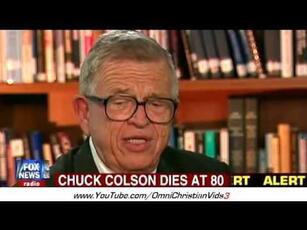
I really cant say "always insightful" about a whole lot of Christian authors, but I can with Colson. His ministry with prisoners was far reaching and touched many many people. It stayed above the scandals of many other ministries, but I always attributed that to the fact that its founder was "born" in the midst of a monumental scandal.
Chuck Colson was the real deal. He has been promoted. I hope to meet him some day when my own promotion has been approved.
Chuck Colson was the real deal. He has been promoted. I hope to meet him some day when my own promotion has been approved.
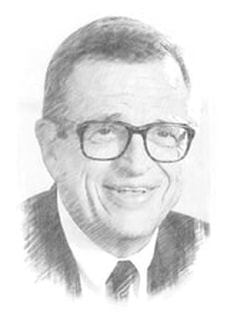
Chuck Colson; October 31, 2007:
It is Halloween again, and to be frank, I really don’t look forward to talking about it on Breakpoint every year. At best, Halloween has become an excuse to ask total strangers for candy. At worst, it’s a celebration of the mindless paganism our ancestors wisely turned their backs on. So, this year, I’d like to turn your attention to the often overlooked celebration that Halloween calls to mind. In case you’ve missed it before, the name Halloween is a shortening of All Hallows’ Eve and signifies the night before All Saints’ Day. For centuries on All Saints’ Day, the Church celebrated the lives of Christians who went before us. And rightly so: We can learn so much from those whom the author of Hebrews calls that great cloud of witnesses.
The tradition of remembering the Church triumphant dates back to the time of the first Christian martyrs. When soldiers of Marcus Aurelius Verus came to arrest Polycarp, a beloved church leader, Polycarp greeted them kindly. According to the third-century historian Eusebius, Polycarp “ordered a table to be laid for them immediately, invited them to eat as much as they liked, asking in return a single hour in which he could pray.” When Polycarp later stood in the coliseum, accused and surrounded by the jeering crowds, the governor pressed him to recant his faith. Instead, this man, who himself had been discipled by the Apostle John, said this: “For 86 years, I have been [Christ’s] servant, and He has never done me wrong: How can I blaspheme my King who saved me?” As they were preparing to burn him alive, Polycarp offered up prayers of faith and praise.
In the years following Polycarp’s death, Christians would gather annually to take communion beside his grave. There they would remember his brave witness and take courage from his example. As the years passed, the day shifted in focusing from remembering Polycarp to honoring all martyrs. By the seventh century, the Church created a holiday to honor all of God’s saints—heroes of the faith. One of my favorite heroes was a woman named Monica, who lived during the fourth century. She would never face flames or jeering crowds, as did Polycarp, but she did face testing. That testing came in the form of her own longing for the return of her prodigal son, Augustine. His licentious lifestyle made this Christian mother weep. Later, when Augustine, who is now known as one of the foremost theologians of Christianity and scholars of Western civilization, did come to Christ, he wrote this prayer: “My mother, Your faithful servant, wept to You for me, shedding more tears for my spiritual death than others shed for the bodily death of a son. You heard her.”
I could tell you story after story like this, from Justin Martyr to Martin Luther to Amy Carmichael. But let me encourage you to do something this All Saints’ Day. Take the lead in your church to honor the great saints who set examples for us. Reacquaint your children with Halloween’s Christian origins. Research together and talk about the lives of Christian heroes. Sure, go ahead and let the kids dress up like Batman and hit up your neighbors for candy. But when the hoopla of modern Halloween is over, encourage your kids to imitate some real heroes—not in what they put on, but in how they live their lives.
It is Halloween again, and to be frank, I really don’t look forward to talking about it on Breakpoint every year. At best, Halloween has become an excuse to ask total strangers for candy. At worst, it’s a celebration of the mindless paganism our ancestors wisely turned their backs on. So, this year, I’d like to turn your attention to the often overlooked celebration that Halloween calls to mind. In case you’ve missed it before, the name Halloween is a shortening of All Hallows’ Eve and signifies the night before All Saints’ Day. For centuries on All Saints’ Day, the Church celebrated the lives of Christians who went before us. And rightly so: We can learn so much from those whom the author of Hebrews calls that great cloud of witnesses.
The tradition of remembering the Church triumphant dates back to the time of the first Christian martyrs. When soldiers of Marcus Aurelius Verus came to arrest Polycarp, a beloved church leader, Polycarp greeted them kindly. According to the third-century historian Eusebius, Polycarp “ordered a table to be laid for them immediately, invited them to eat as much as they liked, asking in return a single hour in which he could pray.” When Polycarp later stood in the coliseum, accused and surrounded by the jeering crowds, the governor pressed him to recant his faith. Instead, this man, who himself had been discipled by the Apostle John, said this: “For 86 years, I have been [Christ’s] servant, and He has never done me wrong: How can I blaspheme my King who saved me?” As they were preparing to burn him alive, Polycarp offered up prayers of faith and praise.
In the years following Polycarp’s death, Christians would gather annually to take communion beside his grave. There they would remember his brave witness and take courage from his example. As the years passed, the day shifted in focusing from remembering Polycarp to honoring all martyrs. By the seventh century, the Church created a holiday to honor all of God’s saints—heroes of the faith. One of my favorite heroes was a woman named Monica, who lived during the fourth century. She would never face flames or jeering crowds, as did Polycarp, but she did face testing. That testing came in the form of her own longing for the return of her prodigal son, Augustine. His licentious lifestyle made this Christian mother weep. Later, when Augustine, who is now known as one of the foremost theologians of Christianity and scholars of Western civilization, did come to Christ, he wrote this prayer: “My mother, Your faithful servant, wept to You for me, shedding more tears for my spiritual death than others shed for the bodily death of a son. You heard her.”
I could tell you story after story like this, from Justin Martyr to Martin Luther to Amy Carmichael. But let me encourage you to do something this All Saints’ Day. Take the lead in your church to honor the great saints who set examples for us. Reacquaint your children with Halloween’s Christian origins. Research together and talk about the lives of Christian heroes. Sure, go ahead and let the kids dress up like Batman and hit up your neighbors for candy. But when the hoopla of modern Halloween is over, encourage your kids to imitate some real heroes—not in what they put on, but in how they live their lives.


